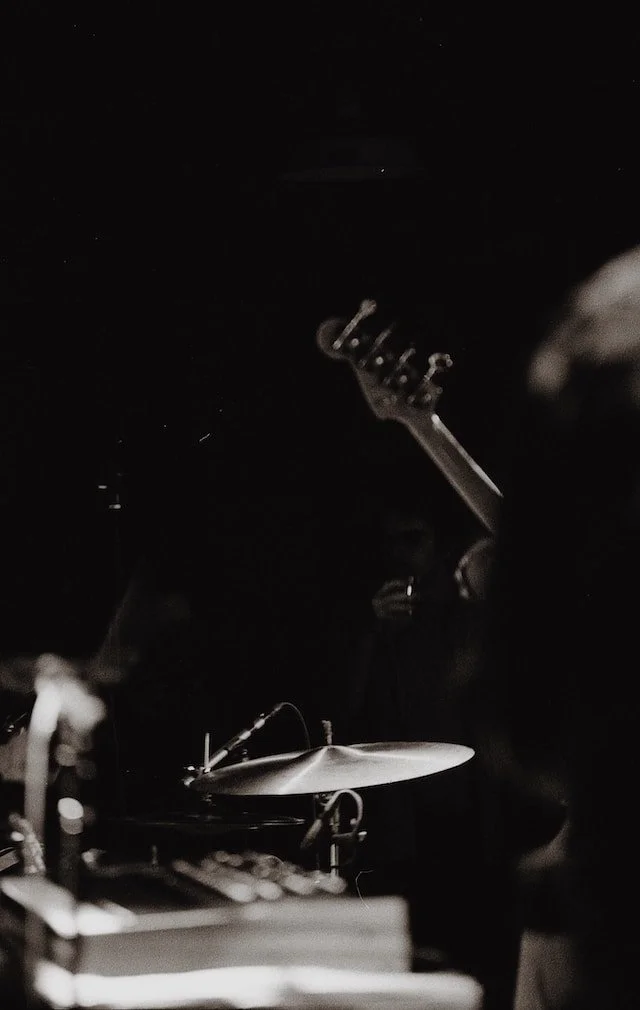Navigating the Music Industry A Guide to Royalties, Copyright, Contracts, and Legal Essentials for Musicians
The world of music is not only about artistic expression and creativity; it's also a complex web of legal and financial considerations that every musician and band should be aware of. In this article, we'll dive into the crucial aspects of the music industry that often remain in the shadows: royalties, copyright, contracts, and legal matters. Whether you're an aspiring metal musician or an established band, understanding these intricacies is essential for protecting your work, ensuring fair compensation, and making informed decisions as you navigate the industry landscape.
Music Royalties Demystified: Unlocking Your Earning Potential
Understanding music royalties is like deciphering a secret code to unlocking the financial rewards of your artistic creations. Let's break it down step by step, shedding light on the various types of royalties and the mechanisms behind them.
1. Mechanical Royalties: These royalties come into play when your music is reproduced and distributed. Think of them as the earnings you receive when your tracks are sold as physical copies, downloaded, or streamed.
Insider Tip: Make sure your music is registered with the appropriate agencies to ensure accurate tracking and payment of mechanical royalties.
2. Performance Royalties: Every time your music is performed in public, whether on the radio, TV, live stage, or through digital streaming platforms, you're owed performance royalties. These payments are managed by PROs, entities dedicated to collecting and distributing these earnings.
Insider Tip: Register with a PRO to ensure you're receiving all the performance royalties you're entitled to.
3. Synchronization Royalties: When your music is synchronized with visual content like films, commercials, or TV shows, synchronization royalties come into play. These can be substantial and offer a fantastic opportunity for exposure.
Insider Tip: Network with filmmakers and content creators to explore synchronization opportunities and boost your revenue streams.
4. Insider Tip for Collecting Royalties: In the digital age, it's essential to leverage technology for tracking and collecting royalties. Utilize music distribution platforms that offer comprehensive reporting tools, allowing you to monitor where and how your music is being used. Regularly audit your earnings to ensure you're not leaving money on the table.
5. Collaborative Royalties: Collaborations can open new doors for revenue sharing. Ensure that agreements with fellow musicians are clear regarding royalty splits.
Insider Tip: Define the terms in writing and establish an amicable understanding to avoid conflicts later on.
6. Maximizing Your Royalty Earnings: Engage with your audience and encourage them to stream, share, and engage with your music on various platforms. The more exposure your music gets, the higher your royalty earnings can be.
Insider Tip: Engage on social media, collaborate with influencers, and create captivating content to amplify your music's reach.
By grasping the intricacies of music royalties and PROs, you're taking significant steps toward securing your financial future in the music industry. Keep these insider tips in your toolkit as you navigate the world of royalties, ensuring that every note you create translates into a well-deserved reward. Your musical journey is not only about artistic expression but also about reaping the rewards of your hard work and dedication.
2. Safeguarding Your Creative Work: Copyright Essentials
In the dynamic landscape of the music industry, protecting your creative work is paramount. Copyright serves as your guardian, providing a sturdy shield around your compositions and sound recordings. Here's your guide to mastering copyright essentials and fortifying your musical legacy:
1. Understanding Copyright Basics: Copyright is automatically granted the moment you create your music. It gives you the exclusive right to reproduce, distribute, perform, and adapt your compositions. This means no one else can use, copy, or profit from your work without your consent. Insider Tip: Familiarize yourself with the scope of copyright protection in your country to know your rights.
2. Marking Your Copyright: While copyright is inherent, it's beneficial to display the copyright symbol (©), your name, and the year of creation. This notice acts as a visual reminder to others that your work is legally protected. Insider Tip: Include this information on your album covers, websites, and promotional materials.
3. Registering Your Copyright: Registering your music with your country's copyright office offers an extra layer of protection and legal standing. It establishes a public record of your ownership and grants you the power to take legal action if your rights are infringed upon. Insider Tip: Consult legal experts or copyright professionals to ensure a seamless registration process.
4. Documenting Your Creations: Maintain a detailed record of your creative process, including drafts, lyrics, and melodies. This documentation can serve as crucial evidence in case of disputes or claims of infringement. Insider Tip: Keep digital and physical copies of your work organized and secure.
5. Collaborative Creations: When collaborating with fellow musicians, establish clear agreements regarding copyright ownership and usage rights. This can prevent misunderstandings and conflicts down the road. Insider Tip: Draft collaboration agreements that outline each party's contributions and rights to the final work.
6. Monitoring and Enforcing Copyright: Regularly monitor the usage of your music online and offline. Utilize technology and platforms that offer content tracking to identify unauthorized use. In case of infringement, take prompt action to protect your rights and seek legal remedies if necessary.
7. Seeking Legal Advice: When in doubt, seek legal counsel from professionals who specialize in copyright law. Their expertise can guide you through complex issues and provide you with tailored advice to safeguard your creative endeavors.
By mastering copyright essentials, you're securing a foundation for your musical journey that is built on legal protection and artistic integrity. Your creative work deserves the highest level of care, and copyright is your ally in preserving the legacy you're crafting in the world of music. So, keep those melodies flowing and those legal safeguards in place – your musical brilliance is worth every ounce of protection.
3. The Power of a Well-Structured Music Contract
In the ever-evolving landscape of the music industry, a well-structured music contract is your compass, guiding you through the intricate maze of collaborations, performances, and partnerships. These legal documents wield tremendous influence, shaping the course of your musical endeavors. Here's a harmonious symphony of advice and insider tips to orchestrate contracts that harmonize your vision, protect your interests, and harmonize the rhythm of your career:
1. Define the Scope with Clarity: A crystal-clear contract outlines the scope of work, leaving no room for ambiguity. Specify the services to be rendered, deadlines, deliverables, and any revisions. Insider Tip: Use concise language to ensure both parties are on the same sheet of music.
2. Compensation and Royalties: Highlight the compensation structure, including payment schedules and royalty arrangements. Whether it's a one-time fee, a percentage of sales, or performance royalties, ensure all financial aspects are orchestrated elegantly. Insider Tip: Address potential scenarios, such as late payments or deductions, to maintain harmony even in the face of discord.
3. Ownership and Usage Rights: Clarify ownership rights to the creative work and the extent of usage rights granted. Will you retain full rights, or are there shared or exclusive rights involved? Insider Tip: Consider future possibilities, like licensing or sample usage, and address them in the contract's harmonious arrangement.
4. Performance and Appearance Agreements: For live performances, detail logistics, sound requirements, set length, and any special requests. If your music graces screens or stages, include clauses for image usage, endorsements, and brand association. Insider Tip: Spell out technical specifications to ensure your performance hits all the right notes.
5. Termination and Force Majeure: Life's cadence can be unpredictable. Outline terms for contract termination and scenarios where force majeure (unforeseen circumstances) could suspend or alter obligations. Insider Tip: Balance protection for both parties, enabling graceful exits or adaptations when needed.
6. Dispute Resolution and Jurisdiction: No one likes to dwell on discord, but it's essential to include provisions for dispute resolution. Specify the process for resolving conflicts, whether through mediation, arbitration, or legal proceedings. Insider Tip: Choose a jurisdiction that aligns with your interests and the scope of the contract.
7. Legal Review and Consultation: Before signing any dotted lines, consider seeking legal counsel. An experienced attorney can review the contract, identify potential pitfalls, and ensure your rights are solidly safeguarded. Insider Tip: Don't skip this vital prelude; it can save you from unforeseen off-key moments.
A harmonious, well-structured music contract is your score for success in the symphony of your musical journey. Each note, clause, and signature plays a crucial role in shaping your narrative and ensuring that every participant dances to the same rhythm. By weaving these threads of advice into your contracts, you're composing a melody of collaboration that resonates with clarity, fairness, and the promise of harmonious prosperity. So, let the ink flow, the clauses align, and your musical journey continue to crescendo on the foundation of well-orchestrated contracts.
4. Legal Aspects Every Musician Should Know
As you journey through the melodic labyrinth of the music industry, navigating legal waters is paramount to ensuring your artistic compass remains true. Here's a harmonious medley of advice and insider tips to help you traverse the legal landscape with finesse, empowering you to make informed decisions and safeguard your creative legacy:
1. Intellectual Property and Trademarks: Intellectual property is your artistic essence, and understanding its nuances is key. Copyright protects your musical compositions and sound recordings, while trademarks guard your distinctive brand. Insider Tip: Registering your work adds an extra layer of protection and fortifies your standing in the musical arena.
2. Defamation and Reputation Management: Your musical journey is a narrative woven with lyrics and melodies. Be mindful that lyrical content and public statements can have legal repercussions. Address defamation concerns by staying truthful and respectful. Insider Tip: Embrace constructive criticism, but remember that damaging your reputation can be discordant to your creative harmony.
3. Collaborations and Agreements: Harmonizing with fellow artists can create masterpieces, but it's essential to formalize your collaborations. Establish clear roles, responsibilities, and ownership rights through collaboration agreements. Insider Tip: Set the stage for a harmonious partnership by outlining expectations from the start.
4. Samples and Cover Songs: Samples and cover songs add texture to your sonic tapestry, but they come with legal responsibilities. Secure the necessary licenses for samples, and respect copyright when covering songs. Insider Tip: Delve into the intricacies of sample clearance and licensing to avoid dissonance with copyright holders.
5. Music Licensing and Royalties: Your music's journey extends to licensing opportunities, sync placements, and streaming platforms. Familiarize yourself with different types of licenses and how they impact your income. Insider Tip: Join performance rights organizations (PROs) to ensure you receive rightful royalties for your compositions' public performances.
6. Contracts and Agreements: Contracts are the maestro's baton in the legal orchestra. Whether for management, record deals, or performance agreements, ensure contracts reflect your interests and aspirations. Insider Tip: A legal expert can help you harmonize contract clauses and safeguard your rights.
7. Online Presence and Privacy: The digital stage is expansive, but respecting privacy and data protection is non-negotiable. Craft a privacy policy for your website, adhere to GDPR regulations, and be cautious when sharing personal information online. Insider Tip: Prioritize transparency and safeguard your fans' trust in your digital interactions.
Embrace the legal symphony as a conductor of your artistic destiny. Armed with these notes of wisdom, you can harmonize your creative endeavors with the legal landscape, crafting a melody that resonates with authenticity, protection, and artistic freedom. So, heed these insider tips, keep learning, and let your legal knowledge compose a legacy as enduring as your music itself.
—
As a metal musician or band, your creative journey is intricately woven with legal and financial considerations. By delving into the world of music royalties, copyright, contracts, and legal essentials, you empower yourself to make informed decisions, protect your intellectual property, and build a sustainable music career. Remember, while the stage and the studio are where your passion thrives, understanding these behind-the-scenes aspects ensures that your hard work is rewarded and your artistry is preserved for generations to come.
As your musical journey continues, remember that legal matters can influence every chord you strike. If you find yourself seeking guidance or looking to harmonize your legal efforts with your artistic aspirations, don't hesitate to reach out, drop me a line and see if we can work together.
Until the next one,
Chelf




